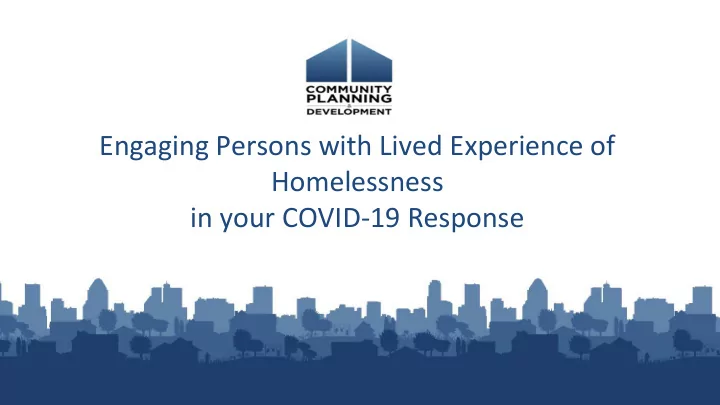

Engaging Persons with Lived Experience of Homelessness in your COVID-19 Response
Housekeeping • A recording of today’s session, along with the slide deck and a copy of the Chat and Q&A content will be posted to the HUD Exchange within 2-3 business days • Event information for upcoming Office Hours, along with copies of all materials can be found here: https://www.hudexchange.info/homelessness-assistance/diseases/#covid-19-webinars- and-office-hours • To join the webinar via the phone, please call in using: 1-855-797-9485, Access code: 613 709 552
Chat Feature Select the Chat icon to make a comment or ask a question . Be certain the To field is set to All Participants An orange dot on the Chat icon indicates that you have unread messages .
Baltimore City’s Emergency Response Plan for People Experiencing Homelessness aims to mitigate the risk of infection for individuals in this vulnerable population. The LEAC is working closely with homeless service providers, public health officials, public and private Baltimore City agencies, and people with lived experience to implement a range COVID-19 Response of prevention and response strategies to support individuals experiencing homelessness in Baltimore City. #BmoreLEAC
Critical Interventions •Emergency Shelter Assessment and Testing •Hospital Discharge Practice •Isolation Sites •Expanded Capacity for social Distancing in shelters •Outreach to people Experiencing Unsheltered Homelessness #BmoreLEAC
Baltimore Staying Connected City & Engaged During COVID-19 #BmoreLEAC
Call to Action • Engaging individuals experiencing homelessness at local, state, and national levels. They are the experts and can help develop effective policy and strategies to prevent and end homelessness. • Educating individuals experiencing homelessness and advocates on local, state, and national efforts such as the Stimulus Package. • Providing individuals experiencing homelessness with access to technology. #BmoreLEAC
Other ways to support people experiencing homelessness. Make a monetary donation by texting "JourneyHome" to 50155 or donate resources. People interested in donating resources can send an email to jessi.stevens@baltimorecity.gov Items currently needed include: • Mobile hand-washing stations • Water (cases of bottled water and gallons) • Hand Soap (gallons and personal bottles) • Non-perishable food and snacks • Hand sanitizer • Socks • First aid kits • Toothbrushes • Toothpaste • Deodorant • Antibacterial wipes • Trash bags • Paper towels • Gloves
Learn More About Us Check out this brochure to learn more about who we are and our work. Our 2019 Annual Report can be found here. #BmoreLEAC
Action Plan on Homelessness 5 Key Strategies
Follow us and Join the conversation on Social media #BmoreLEAC Questions? email us at journey.home@baltimorecity.gov
National Coalition for the Homeless 2201 P Street NW Washington, DC 20037 info@nationalhomeless.org PH: 202.462.4822 Fax:202.462.____
Information to share includes: • Provide straightforward communications to people sleeping outside in the appropriate language. • Identify people who are influential in the community who can help communicate with others.
Information to share includes: • Post signs in strategic locations to provide information on hand hygiene, respiratory hygiene, and cough etiquette. • Request up-to-date contact information for each person.
Information to share includes: • The most recent information about COVID-19 spread in their area. • Advice to avoid crowded areas if COVID-19 is circulating in their community.
Information to share includes: • Advice not to share personal items. • How to recognize the symptoms of COVID-19 and what to do if they are sick. • What to do if their friends, family, or community members are sick. • How to isolate themselves if they have symptoms. • Updated information on where to find food, water, hygiene facilities, regular healthcare, and behavioral health resources.
Communicating with People Experiencing Homelessness During the Coronavirus • Normalize The Process • People Experiencing Homeless want to communicate, especially now. • Be Creative • Take advantage of the interventions in your community
Communities can utilize the same tools that are being used in other settings • Zoom Meeting • Go To Meeting • Google Meetings • Conference calls
PEER SUPPORT
COMMUNITY GROUPS
Speakers • Juanita Perry, HUD Office of Special Needs Assistance Programs • Lisa Coffman, HUD Office of Special Needs Assistance Programs • Donald Whitehead, National Coalition for the Homeless • Kelvin Lassiter, National Coalition for the Homeless • Shawn Jones, Baltimore Lived Experience Advisory Committee • Anthony Williams, Baltimore Lived Experience Advisory Committee 24
Engaging Persons with Lived Experience • Key Concepts from our January 2020 InFocus Message • Improve the Quality and Effectiveness of Homelessness Assistance • Meaningful Partnerships • Relevant and Responsive Service Interventions 25
Resources • National Coalition for the Homeless http://nationalhomeless.org/ • HUD Exchange Ask-A-Question (AAQ) Portal: https://www.hudexchange.info/program-support/my-question/
Q & A 27
Recommend
More recommend